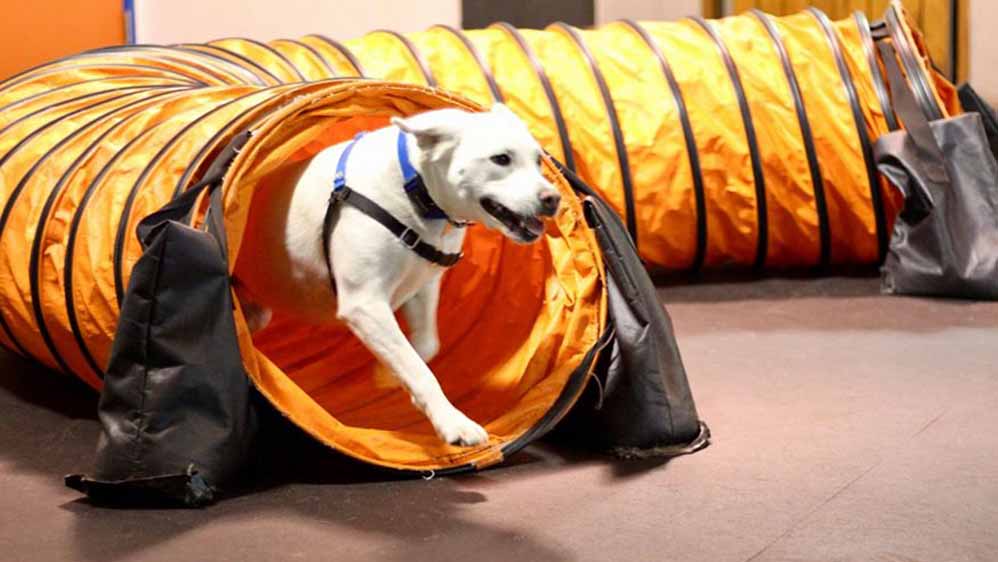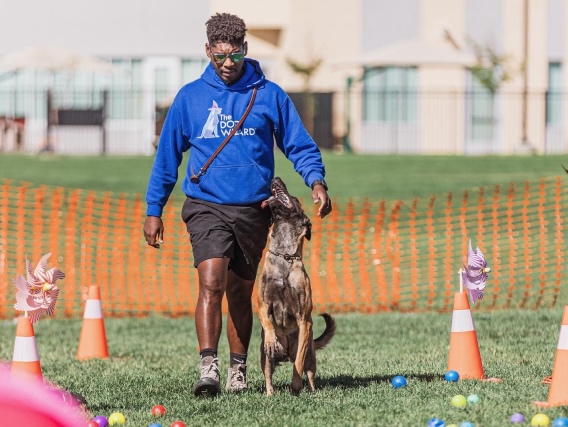Open the Tricks of Efficient Dog Training Near Me for a Happier Pet
Open the Tricks of Efficient Dog Training Near Me for a Happier Pet
Blog Article
Unlock Your Dog's Possible: Proven Pet Training Techniques for Success
Reliable pet training is a nuanced process that hinges on comprehending canine habits and using medically backed methods. By including positive reinforcement, establishing clear commands, and focusing on socializing, dog proprietors can grow an efficient relationship with their pets.
Understanding Canine Actions
Comprehending pet dog actions is essential for reliable training and promoting a positive partnership between pets and their proprietors. A thorough understanding of canine body movement, vocalizations, and social communications is critical for recognizing their emotions and demands. Canines communicate primarily through non-verbal hints; for example, a wagging tail may indicate enjoyment, while pinned ears can signal anxiety or entry.

Moreover, ecological elements play a significant duty in forming a dog's actions. Modifications in regular, new surroundings, or the presence of strange individuals can lead to stress or stress and anxiety in pets. Acknowledging these triggers allows owners to reduce adverse responses and create proper training methods.
Inevitably, a deep understanding of dog actions lays the foundation for effective training techniques, boosting both habits and the general bond between the canine and its proprietor. dog training near me. This understanding is crucial for fostering a well-adjusted, delighted canine buddy
Favorable Reinforcement Strategies
Effective training relies greatly on favorable reinforcement strategies, which have actually been revealed to yield significant results in forming desired habits in pet dogs. This strategy entails awarding a pet dog for showing details habits, therefore enhancing the likelihood that these behaviors will be duplicated. Incentives can take various kinds, consisting of deals with, praise, toys, or play, depending on what motivates the specific pet dog.

It is necessary to gradually terminate benefits as the canine learns the behavior, transitioning to intermittent reinforcement. This technique preserves the actions in time while protecting against reliance on constant rewards. By concentrating on favorable reinforcement, trainers can cultivate a trusting partnership with their pets, advertising a healthy and balanced and participating training atmosphere that enhances overall obedience and efficiency.
Establishing Regular Commands
A fundamental aspect of successful pet training is the establishment of consistent commands. Consistency in commands is critical for efficient communication in between the trainer and the pet dog. When commands are uniform, dogs learn to associate details words with desired habits, which increases the training procedure and improves understanding.
To establish consistent commands, it is crucial that all member of the family make use of the exact same terminology and motions. If one individual utilizes "rest" while one more states find out this here "rest down," it can create confusion for the canine. Select clear, distinct words for commands and make sure everybody associated with the canine's training sticks to these options.
Furthermore, rep is key. Strengthen commands with frequent method, ensuring that the dog obtains ample chances to respond correctly. When a canine effectively adheres to a command, prompt positive support needs to follow. This might be in the kind of treats, praise, or playtime, strengthening the link in between the command and the action.
Lastly, hold your horses. Developing regular commands takes some time and initiative. With commitment and clearness, you will help your dog create a solid understanding of expectations, ultimately leading to a mannerly buddy.
Socializing and Direct Exposure
Mingling a pet dog is necessary for promoting a well-adjusted and certain friend. This process entails exposing your pet to a range of settings, people, and various other animals to develop their social skills and adaptability. Early socialization, ideally in between the ages of three to fourteen weeks, is important, as it prepares for a pet dog's future habits.
During socialization, aim to supply positive experiences in various settings, such as parks, active streets, and homes with various other pet dogs. Present your canine to numerous stimulations, including audios, sights, and smells, ensuring that each experience is satisfying. This exposure aids reduce anxiety and anxiousness, leading the way for an extra durable pet dog.
Participating in controlled team play sessions with various other pet dogs can also improve social skills, teaching your pet suitable interactions and limits. Constantly check your dog's comfort level throughout these experiences, progressively increasing exposure as their self-confidence expands. Remember, the goal is to create an all-round pet dog that prospers in varied scenarios, advertising a harmonious connection with both human beings and other animals. Focusing on socializing will dramatically add to your canine's total joy and actions throughout their life.
Overcoming Common Training Obstacles

Dogs might have a hard time to concentrate in hectic or unfamiliar settings. Progressively desensitize your pet dog to disturbances by starting training in a silent environment and gradually presenting even more stimuli as they become proficient.
Furthermore, behavioral concerns like leaping or extreme barking can end up being irritating. Address these by instructing alternate behaviors, such as resting calmly when stop dog whining in crate welcoming visitors. Consistency and patience are crucial; enhance wanted habits continually and avoid abuse, which can lead to confusion.
Last but not least, recognize that each canine is unique, and training timelines may differ. Dressmaker your approach to your pet's private needs, and seek specialist advice if needed. With willpower and the ideal methods, getting rid of these obstacles can lead to a trained, happy canine buddy.
Final Thought
To conclude, opening a dog's potential requires a thorough strategy that integrates an understanding of canine habits, the application of favorable support techniques, and the establishment of constant commands. Early socialization and direct exposure to diverse settings even more boost a pet's flexibility and self-confidence. By attending to typical training challenges with customized techniques and perseverance, a unified and cooperative connection in between dog and handler can be fostered, ultimately leading to a mannerly companion with the ability of flourishing in numerous situations.
Effective pet dog training is a nuanced process that hinges on comprehending canine habits and using medically backed methods.Recognizing canine behavior is vital for effective training and fostering a positive connection in between canines and their proprietors.Reliable training depends greatly on positive support methods, which have actually been revealed to generate substantial results in shaping desired behaviors in pets. When commands are uniform, dogs discover to connect details words with desired habits, which speeds up the training process and improves understanding.
In final thought, opening a canine's potential requires a detailed technique that includes an understanding of canine actions, the application of favorable support methods, and the facility of regular commands.
Report this page